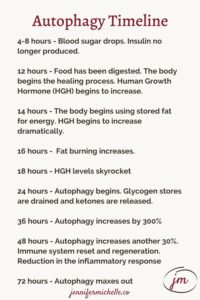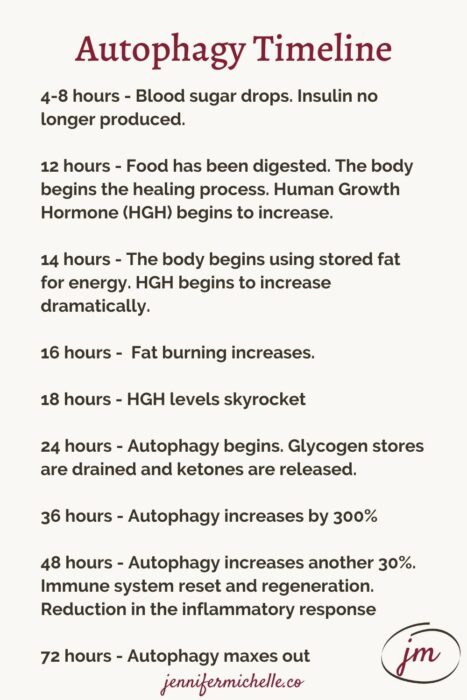I earn a small commission via affilate links at no extra cost to you.
If you’ve been paying attention you already know that intermittent fasting is the new buzzword in the health and wellness space. Sitting at the playground I’ve heard moms brag about how they’re currently fasting. A quick internet search shows that most people flock to intermittent fasting for weight loss. The problem I see is that people take a buzzword and run with it without fully understanding it. I fear that many have simply taken the starvation diet model and given it a hip cool new name “intermittent fasting.” Before you jump straight in I have some intermittent fasting tips for beginners. Learn what the possible intermittent fasting side effects are, and the ultimate health benefit called autophagy.
What Is Intermittent Fasting?
Intermittent fasting is a time period that you are not eating. Many people choose to fast with the largest chunk of time that includes their nightly sleep. A typical intermittent fast is usually done between dinner and a late breakfast the next day. However, to really reap the benefits of intermittent fasting you need more than 8-12 hours. Most research shows that 18+ hours is when the magic begins to happen. However, forcing yourself to go hungry in pursuit of intermittent fasting isn’t how it’s done. If you’re only skipping your afternoon snack because you’re fasting you’re not really getting any fasting benefits.
Weight loss has made intermittent fasting popular in combination with the keto diet. It’s about much more than weight loss though. Intermittent fasting is one of the greatest tools available for healthy aging and cancer prevention. The ultimate benefit of intermittent fasting is autophagy. More on that in a bit.
How To Begin Intermittent Fasting: Become Fat Adapted
The best intermittent fasting tip for beginners begins with this one simple rule, teach your body how to access stored body fat for fuel. When your body remembers how to use stored body fat for fuel intermittent fasting is easy. It’s also how people use intermittent fasting for weight loss. If you’ve been eating a grain-based diet the odds are, your body relies on a constant supply of glucose for energy. Starving yourself in pursuit of fasting can be done but it’s not likely going to be a pleasurable experience.
When your body is used to a steady stream of carbohydrates through your diet and you suddenly stop it’s going to activate that fight or flight stress response. In a state of stress, your body releases cortisol and cortisol pulls glucose out of storage so that your body can use it. When your muscles and liver run out of glucose to release, (they don’t store very much), your body begins breaking down tissues, like muscle, in order to manufacture glucose. This is one of the negative side effects of intermittent fasting if you don’t set up your fat-burning metabolic machinery first.
How do you become fat-adapted? You have to change your diet consistently. That is, you have to give your body the space to remember how to access stored body fat for fuel. If you’re feeding it a steady stream of carbohydrates all day it keeps insulin levels high. Insulin is the hormone that allows the body to store glucose as glycogen. When insulin levels are high they prevent the body from accessing stored body fat for fuel.
Should you go keto right away? You can, but it’s not likely going to be pleasant. Plus, if you’re taking medications you definitely want to work with a physician who will work with you. Insulin is the master hormone and it affects a number of bodily systems. Reducing your carbohydrate intake reduces insulin production, and you may need to have your prescriptions adjusted as you make a low-carb transition.
Side Effects of Intermittent Fasting
If you’re a beginner to intermittent fasting and you jump straight in with forced time blocks, or you force your body to immediately go keto, you’re not going to enjoy the process. Most people who switch from the standard American diet to the Paleo Diet (higher in carbohydrates than keto) end up with carb flu. The carb flu is one of the negative side effects of intermittent fasting, especially if you’re trying to do a multi-day fast. Most people I know that have tried multi-day fasts without becoming fat-adapted first typically don’t make it to their goal.
Carb flu isn’t the actual flu, rather it’s what happens when you remove your body’s primary fuel source (glucose) and ask it to remember how to use protein and fat for fuel instead. The body has that ability, it’s how our ancient ancestors survived before agriculture was invented. Making the immediate switch though you’ll experience fatigue, moodiness, body aches, headaches, digestive changes, and poor sleep.
 Tip: Intermittent Fasting Should Be Easy
Tip: Intermittent Fasting Should Be Easy
For most people, it takes about 3-4 weeks of consistent paleo-style eating to begin feeling the effects of fat adaptation. You’ll notice that you feel better, sleep better, your clothes may fit better, your mood will change, and your sense of hunger will change. Instead of getting ravenously hungry, hunger will become a gentle reminder. One day you’ll look at the clock and realize that you haven’t eaten in a very long time and you didn’t feel hungry at all. This is one of the signs that your body is becoming better at using fat for fuel. If you want to avoid the carb flu and side effects of intermittent fasting without preparing for it first, then fat adaption should be your first goal.
When you begin to notice these things that is a great time to begin simply paying attention to your fasting window. After you eat dinner simply notice how long it takes before you get hungry the next day. Another positive intermittent fasting side effect is that with time you should notice the time it takes for you to feel hungry getting longer. It should feel easy rather than forced.
This is also one of the secrets of why the keto diet isn’t any more expensive. When you switch from eating all day long to only eating twice a day, or once a day, I often suspect the keto diet is cheaper. When you can pass the keto quiz it’s a sign that your body is ready for the keto diet.
Is Intermittent Fasting The Same As Calorie Restriction?
It depends on how you define calorie restriction. If your definition includes a forced reduction of your total caloric consumption by X number of calories per day then no. That is not what intermittent fasting is, rather it’s limiting calories during an extended period of the day or days. When you get around to eating you should always eat to satiety (a feeling of fullness) with high fat, moderate protein, and low carb eating approach. How much should you consume? Honestly, it depends on the person. Gender, activity level, age, and health goals are all factors to consider when setting macro targets. The big things to avoid are grains, added sugar/sweeteners, vegetable oil, and an abundance of legumes.
 Health Benefits of Intermittent Fasting: It’s All About Autophagy
Health Benefits of Intermittent Fasting: It’s All About Autophagy
There are a number of cleanses, teas, and detox programs on the market but the best detox is already built into your physiology. It’s called autophagy (UH-TOFF-A-GEE). When the body enters the state of autophagy your cells begin repairing themselves, they do a little housekeeping. This is one of the positive intermittent fasting side effects. In autophagy, our cells rid themselves of unnecessary proteins that may be damaged or malfunctioning. Then it recycles those amino acid ‘spare parts’ into new cellular components.
The thing is that in order for autophagy to be activated nutrients have to be scarce, i.e. you have to be in a fasted state. When protein and insulin are introduced to the body they shut off autophagy, hence why you really shouldn’t eat all day long.
The main regulator of autophagy is the target of rapamycin (TOR) kinase. It is also referred to as mammalian TOR (mTOR). When mTOR goes up, it shuts down autophagy. When you eat protein mTOR is exquisitely sensitive to those amino acids.
Another regulator of autophagy is AMPK. When AMPK is high cellular fuel is low. It shuts down fatty acid synthesis and activates autophagy. This makes sense. If your cells are low on energy they don’t want to store energy (make fat), but instead will want to activate autophagy – getting rid of excess protein and possibly burning it for energy.
- mTOR – sensitive to dietary protein
- AMPK – fuel gauge of the cell
- Insulin – sensitive to protein and carbohydrates
When these nutrient sensors detect low nutrient availability, they tell our cells to stop growing and start breaking down unnecessary parts – this is the self cleansing pathway of autophagy.
How Does Snacking Create Premature Aging?
When your body is used to using glucose as a primary fuel source you’ll find that you’re naturally hungry more often. The body burns through glucose quickly and the moment blood glucose begins to drop the body triggers the hunger signal. When you’re always snacking it turns off autophagy. When autophagy is turned off your cells aren’t in a state of housekeeping. Rather they’re continuously receiving messages that there is energy available so they need to grow and divide. That’s the very definition of cancer: uncontrolled cellular replication and growth. This is why some are finding great success by using the keto diet or carnivore diet during cancer treatment.
With each cellular division your cells are making a copy of a copy. If you went to the copy machine and made a copy of a picture the first one would turn out pretty well. Now imagine that you make a copy of the copy and keep replacing what you’re copying with the latest copy. Over time the image will degrade because a little gets lost with each copy. (Of course, this analogy works better if you imagine an old copy machine.)
At the end of your DNA there are telomeres and telomeres determine how many times your cells can divide. Telomeres are a marker of longevity. The longer your telomeres are the longer you should be able to live. With every cell division your telomeres are shortened. People who say that they need to “speed up their metabolism” are saying that they need to increase the rate of cellular division, shortening their telomeres, and essentially racing towards death.
What Does The Science Say About Autophagy & Premature Aging?
When autophagy is turned off cells are signaled to grow. What do we know about cellular growth?
While most people think growth is always good, the truth is that, in adults, growth is almost always bad. Cancer is too much growth. Alzheimer’s disease is the accumulation of too much junk protein (neurofibrillary tangles) in the brain. Heart attacks and strokes are caused by atheromatous plaques. These are excess accumulation of many things, but prominently, smooth muscle cells, connective tissues and degenerative materials. Yes. Too much growth of smooth muscle is instrumental in causing atherosclerosis that causes heart attacks. Polycystic diseases like kidneys and ovaries are too much growth. Obesity is too much growth. [1]
Autophagy is neuroprotective; it keeps your brain healthy.
Disruption of autophagy can cause neurodegeneration in tissue culture and in vivo. Upregulation of this autophagy may be neuroprotective [3]
Cellular repair is a key component to healthy aging. Diseases such as cancer, heart disease, Alzheimers, liver disease, metabolic syndrome, and Crohn’s disease are all potentially avoided when the body is regularly allowed to enter the state of autophagy.
Alterations in autophagy occur in systemic diseases such as cancer [4], metabolic dysfunction [5] and vascular instability [6] and in organ-specific pathologies such as neurodegeneration [7], cardiomyopathies and myopathies [8, 9], non-alcoholic fatty liver disease [10] or Crohn’s disease [11].
Snacking & Premature Aging
You don’t need a snacks if you want to age well and potentially avoid chronic disease. How do you get off of the carbohydrate driven hunger pangs? In this post I give you 6 simple steps to help. Do you need to reach low carb perfection for the rest of your life? No. Rather having a body that is able to intermittent fast and enter autophagy is something that you should have in your toolbox.
References
[1] Fasting & Autophagy – Part 1
[2] Autophagy In Human Disease – Part 2
[3] Short Term Fasting Produces Profound Neuronal Autophagy
[4] Autophagy in Tumorigenesis and Energy Metabolism: Friend by Day, Foe by Night
[5] Autophagy regulates lipid metabolism
[6] Autophagy in Vascular Disease
[7] The role of autophagy in neurodegenerative disease
[8] Tuning flux: autophagy as a target of heart disease therapy
[9] Cellular and molecular mechanisms of muscle atrophy
[10] Liver Autophagy: much more than just taking out the trash
[11] A unique role for autophagy and Atg16L1 in Paneth cells in murine and human intestine
Originally posted on February 9, 2021 @ 14:13




 Tip: Intermittent Fasting Should Be Easy
Tip: Intermittent Fasting Should Be Easy
 Health Benefits of Intermittent Fasting: It’s All About Autophagy
Health Benefits of Intermittent Fasting: It’s All About Autophagy
